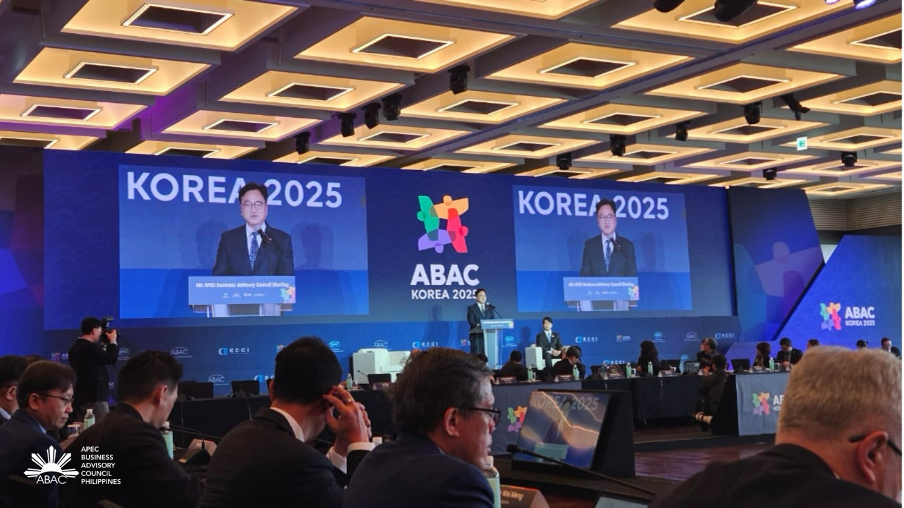
Speaker Woo Won-shik of the National Assembly of the Republic of Korea Urges Policy, Business, and Legislative Cooperation for Peace-Centered Prosperity at ABAC IV in Busan
October 26, 2025, Busan, Republic of Korea – At the Fourth APEC Business Advisory Council (ABAC IV) Meeting in Busan, Speaker Woo Won-shik of the National Assembly of the Republic of Korea urged Asia-Pacific economies to align government, business, and legislative actions to achieve sustainable and peace-centered prosperity. Addressing delegates from 21 APEC member economies, he emphasized that regional stability, inclusive growth, and institutional coordination are the foundations of lasting economic progress.
Reframing APEC’s Role in a Fragmented Global Economy
Woo presented a view of APEC not merely as a forum for trade dialogue but as a mechanism for policy convergence that aligns public governance, private enterprise, and legislative frameworks. Economic resilience, he said, depends on how effectively economies can institutionalize cooperation beyond short-term executive actions.
This tripartite model reinforces ABAC’s function as the region’s bridge between government vision and market execution. Woo emphasized that the Council’s policy recommendations must translate into coherent national frameworks capable of managing technological disruption, climate transition, and supply chain volatility.
His message reflected the broader APEC challenge of transforming consensus into capacity, urging member economies to deepen legislative engagement so that trade and investment liberalization efforts are sustained through long-term policy continuity.
Strategic Priorities for Regional Cooperation
Woo identified a set of priorities that, taken together, outline an adaptive framework for APEC’s next phase of growth.
He reaffirmed the need to protect free and fair trade, warning that the rise of unilateral protectionism undermines regional integration. The Green Trade Framework was highlighted as a shared opportunity to align climate objectives with economic competitiveness, provided that environmental rules do not evolve into new barriers to market access.
He also underscored the urgency of establishing digital governance and trust, noting that the expansion of artificial intelligence, data mobility, and digital identity requires cross-border standards on ethics and accountability. Technology-driven economies, he argued, cannot remain sustainable without cooperation on transparency and interoperability.
Finally, Woo described economic inclusion as an essential driver of resilience, asserting that participation by women, youth, indigenous communities, and small and medium-sized enterprises expands innovation capacity and strengthens market adaptability.
Peace as an Economic Imperative
A central element of Woo’s address was his argument that peace must be treated as an economic condition rather than a diplomatic aspiration. He cited data showing that conflicts erased approximately USD 19 trillion in global output in 2023, equal to 13.5 percent of world GDP. Renewed instability in the Korean Peninsula, he noted, could contract global output by nearly 4 percent and disrupt key production networks, particularly in semiconductors and electronics.
Woo called for APEC economies to evolve from cooperation for prosperity toward cooperation for peace, asserting that interconnected trade and investment systems function as the most practical mechanisms for conflict prevention and long-term trust-building. Economic interdependence, in this sense, becomes both a stabilizer of growth and a deterrent to conflict.
Toward the APEC CEO Summit and Leaders’ Dialogue
The outcomes of the ABAC IV Meeting will inform the upcoming APEC CEO Summit, which will take place in Gyeongju, Republic of Korea from October 29 to 31, following the conclusion of the Council’s sessions. On October 31, the ABAC Dialogue with Leaders will be held as part of established APEC practice, allowing business representatives to engage directly with heads of government.
President Ferdinand R. Marcos Jr. of the Republic of the Philippines is scheduled to attend the Dialogue, together with other APEC Leaders, to discuss private sector recommendations on trade, digital transformation, sustainability, among others.
____________________________________________________________
APEC Member Economies: Australia; Brunei Darussalam; Canada; Chile; China; Hong Kong, China; Indonesia; Japan; Korea; Malaysia; Mexico; New Zealand; Papua New Guinea; Peru; Philippines; Russia; Singapore; Chinese Taipei; Thailand; United States of America; and Viet Nam.
ABAC was created by APEC Leaders in 1995 to be the primary voice of business in APEC. Each economy has three members who are appointed by their respective Leaders. They meet four times a year in preparation for the presentation of their recommendations to the Leaders in a dialogue that is a key event in the annual APEC Economic Leaders Meeting.
Under Korea’s leadership, ABAC is pursuing a work program under the theme “Bridge. Business. Beyond.” to respond to the challenge of maintaining the economic vitality of the Asia-Pacific Region and ensure it benefits all.
ABAC 2025 Chair is Kyuho Lee (Korea) and the Co-Chairs are Julia Torreblanca (Peru) and Fanrong Li (China), with five (5) working group chairs, namely: Anna Curzon (New Zealand), Regional Economic Integration Working Group (REIWG); Junichiro Ikeda (Japan), Sustainability Working Group (SWG); Michaela Browning (Australia), Finance and Economic Working Group (FEWG); Jan De Silva (Canada), AI and Digital Innovation Working Group (AIDIWG); and Kyuho Lee (Korea), Bio and Healthcare Working Group (BHWG).
For further information, please contact ABAC Secretariat at secretariat@abac.ph via email.